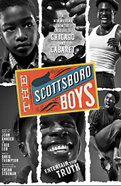The Scottsboro Boys' Joshua Henry on His Busy Road to Leading Man
Hometown: Miami, FL
Age: 26
Currently: Starring in The Scottsboro Boys as Haywood Patterson, a young African-American man falsely accused of raping a white woman in 1931 Alabama.
High School Musical: Henry’s show business aspirations didn’t kick in until his senior year in high school, when he starred in the title role of The Music Man. “I had no doubts as soon as I started performing,” he says. "I felt so at home." Entering the University of Miami the following year to study musical theater, he realized his lack of a stage background meant he needed to work twice as hard. “I had to play catch-up, so from 8AM until three in the morning I was listening to cast recordings, reading plays and finding out all I could about the business.” As graduation approached, Henry got ready to move to New York where—thanks to a college showcase—he had already landed the role of Judas in the Paper Mill Playhouse staging of Godspell.
Heading to the Heights: While in Godspell, co-star [future two-time Tony nominee] Robin de Jesus recommended that Henry audition for a reading of a new show called In the Heights, and the young actor won a place in the ensemble and understudied Benny during the off-Broadway premiere run. “I knew on my first rehearsal that it was the most special thing I’d been involved in; I was sitting there in tears," he recalls. “But who knew it would win the Tony? The show’s journey was phenomenal.” After following In the Heights uptown, Henry frequently found himself onstage covering for Christopher Jackson. “To be honest, I thought, ‘Whoa, this is a lot easier than the ensemble,’” Henry says with a laugh. “That’s when I really became aware of how important every aspect of theater is. In the ensemble, we’re busting our tails to be the bookends of what’s going on with the principals, so it made me appreciate my work. I kept thinking when it came time for me to originate a role, I would give my all and not just sit back."
Leaving the Barrio: Soon after Heights scored its big Tony win, Henry gave his notice to depart the show and join a planned Broadway revival of Godspell (again as Judas), which was canceled due to financial problems. “That’s one of those moments you realize how crazy this business is. You can go from being at the top to suddenly hitting these big waves of emotion…it was a good shock to have early." Henry didn’t stay unemployed for long: He returned to Heights as a swing, scored the role as the Tin-Man in Encores! summer run of The Wiz and made a high-profile film appearance as Jennifer Hudson’s boyfriend in the first Sex and the City movie. “One day I went back to Jennifer’s trailer and she was eating chicken wings and I thought, ‘This is an Oscar-winner, inviting me to eat. Does it get any better than this?’” he remembers. “I realized no matter how famous you are, you’re still human and sometimes you need a chicken wing!”
Going Green: Chicken wings were no longer on the menu for Henry as he got cast as an army man in Green Day’s rock opera, American Idiot. “That’s probably the most exhilarated feeling I’ve had onstage,” he says of the “Favorite Son” song he performed in his underwear with a gaggle of fawning female back-up singers. “To be almost naked and have six girls around you singing about how sexy you are…I’m not that guy, so to play that guy is like living your life at 100 miles per hour.” Two months into Idiot’s Broadway run, Henry made the difficult decision to depart the show when he had the opportunity to join The Scottsboro Boys for its pre-Broadway engagement in Minneapolis.
One of the Boys: The Scottsboro Boys isn’t simply Henry’s first leading Broadway role—it’s the lead in the final collaboration between Chicago and Cabaret composers John Kander and the late Fred Ebb. “I had tests on these people at school, and now I’m not only working with John Kander, but he’s pulling me in a corner to tell me he loves what I’m doing? It just feels crazy,” Henry gushes. Aside from pleasing the Broadway great, Henry also has the responsibility of telling the true life story of Haywood Patterson, the innocent man turned lifetime convict. “His voice wasn’t heard while he was going through the trials and rough times, so to tell audiences the conditions he faced in prison and how he felt day to day is a privilege,” Henry says of the racially charged story. “Every night the cast gets in a circle and reminds ourselves how it important it is to tell the story of these men and make it matter.”
Related Shows
Star Files
Articles Trending Now
- Good Night, and Good Luck, Starring George Clooney, Opens on Broadway with Glitz and Glam But No Egos
- Adrienne Warren and Nick Jonas Open The Last Five Years, Jonathan Groff Dances as Bobby Darin and More on The Broadway Show
- All Aboard for Pirates! The Penzance Musical: The Swashbuckling Saga of Gilbert and Sullivan’s Comic Operetta

